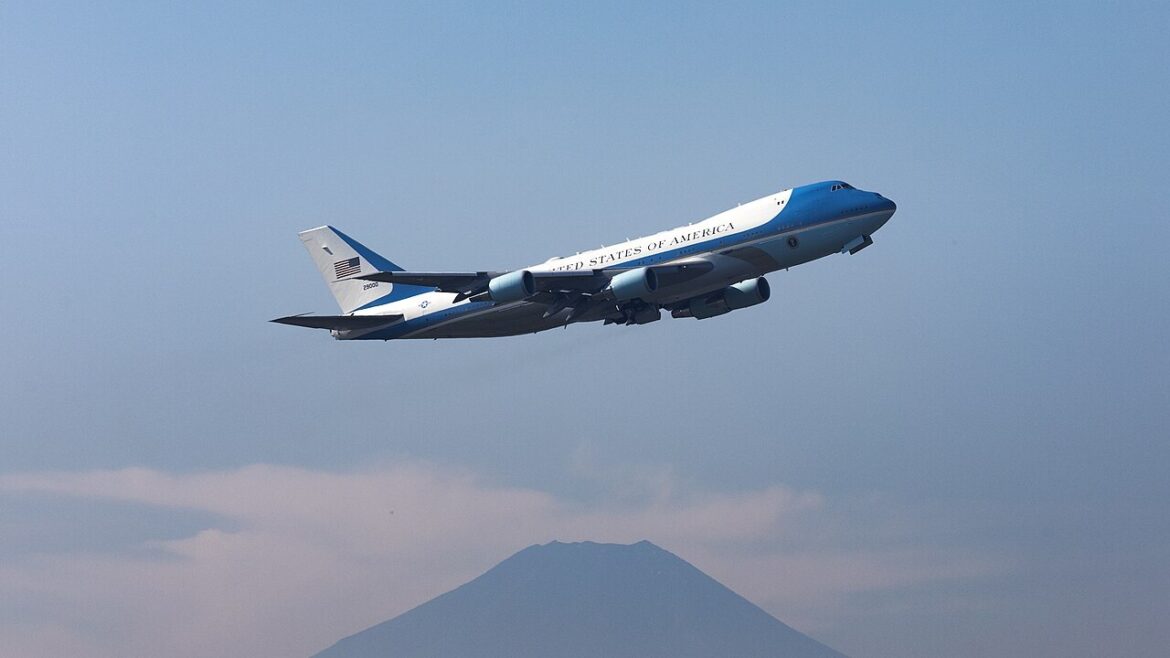Trump should be careful accepting such an important gift as Air Force One—particularly from such a contentious partner.
The royal family of Qatar has offered President Donald Trump a 747 Boeing jet as a temporary replacement for the famous Air Force One aircraft. In an unusual move, the President has indicated that he would be accepting the plane—estimated to be worth approximately $400 million.
Tasked with ferrying U.S. presidents and high-ranking officials in the U.S. and around the world, Air Force One is a special aircraft and outfitted with advanced technology. Accepting and using such a gift from a foreign government, however, comes with significant risk.
Qatar’s 747 Jet Could Replace Boeing’s Air Force One
“The Defense Department is getting a gift, free of charge, of a 747 aircraft to replace the 40-year-old Air Force One, temporarily, in a very public and transparent transaction,” President Trump wrote on the Truth Social social media platform on Monday.
After the news broke, Qatar contradicted some of the reports, claiming that there were still ongoing negotiations.
Boeing is currently working on the next Air Force One aircraft, with two planes under construction. However, delays and price increases have caused frustration at the White House.
It remains to be seen whether Trump’s statements are a negotiation tactic to push Boeing to deliver the new Air Force Ones faster and cheaper.
Should Trump Look This Gift Horse in the Mouth?
When it comes to intelligence, a superpower like the United States can never be too cautious. Indeed, in the shadowy intelligence world, one can have partners and, if lucky, friends, but never close confidants. Accepting an airplane from a foreign country that is not even one of the closest U.S. allies is risky. A great story from the Cold War that highlights the danger of such transactions.
In the final days of World War Two, a group of children representing the Vladimir Lenin All-Union Pioneer Organization, a Communist youth organization, visited the U.S. embassy in Moscow and presented Ambassador W. Averell Harriman with an intricately-carved wooden plaque with the Great Seal of the United States. The move was seen as a sign of friendship between the two allies who fought Nazi Germany and Imperial Japan.
In reality, of course, the wooden plaque had not been made by Russian schoolchildren. The “gift” was made by the KGB—and was equipped with a microphone that the Soviets used to eavesdrop on highly classified discussions for years. It was only after a U.S. military officer overheard American voices talking while listening to classified Russian communications that the U.S. realized that it had been tricked.
“The Great Seal. Remember the Great Seal that some [Russian] third graders carved for the president?” Richard “Dickie” George, a veteran National Security Agency (NSA) officer and former technical director of the agency’s Information Assurance Directorate (IAD), said about the Russian ploy. “I have seen that great seal. I’ll tell you, third graders did not carve that great seal. That is really nice. It also has a really nice listening device inside it. [And] it worked for a little while.”
If there was one lesson from the incident, it was that, at least from an intelligence standpoint, one should never trust a gift from a foreign government.
About the Author: Stavros Atlamazoglou
Stavros Atlamazoglou is a seasoned defense journalist specializing in special operations and a Hellenic Army veteran (national service with the 575th Marine Battalion and Army HQ). He holds a BA from the Johns Hopkins University and an MA from the Johns Hopkins’ School of Advanced International Studies (SAIS). His work has been featured in Business Insider, Sandboxx, and SOFREP.
Image: Wikimedia Commons.


AloJapan.com